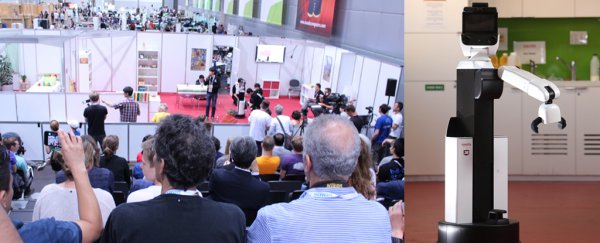How far away is a robot that could help you around the house with domestic tasks such as putting away the groceries, cleaning up messes and answering simple questions?
Although self-driving cars are already here and now, roads are a lot more consistent to navigate than the average – and wildly variable – family home. A domestic robot needs to be an incredibly complex machine.
But that hasn't stopped researchers from the University of New South Wales, and eleven other teams from around the world from working on this domestic problem right now for the RoboCup@Home competition, taking place in Nagoya, Japan, this week.
The UNSW team has been working with a Toyota Human Support Robot, which they've nicknamed Thirty-six, for the last five months, to code the robot to be the best domestic helper it can be.
Simple tasks are often much more complicated than you think once you need to break it down for a robot.
Imagine your helper is putting away your groceries. If it grabs the bread too hard it would squish it, but a much tighter grip would be required on a bag of potatoes to actually pick it up.
Then you'd have to know where to put the different objects – as you don't want milk to accidently end up in the pantry instead of the fridge.
Groceries are just one of many tasks required of the little robot in the kitchen, living room and more.
"One event is designed to assess human interaction. Thirty-six will be put in a circle surrounded by people. There will be lots of noise and background conversations going on," says one of the UNSW team members, Germán Castro.
"A person will start talking to the robot and ask a question. Thirty-six will have to turn around, find this person, and respond."
In Nagoya, Thirty-six will have to deal with information it hasn't come across before, but the team is excited for the challenge.
"We will input information to Thirty-six on where the living room is, and some of the known objects it will have to deal with, for instance particular groceries such as apples," says Castro.
"When it is given the task of putting the food away it should pile up the apples together on the table first, but there will be some objects in the mix that it won't know and will have to decide what to do with them."
We can't wait to meet this new class of helper bots real soon. Good luck, teams!
UNSW Engineering is a sponsor of ScienceAlert. Find out more about their world-changing research.
